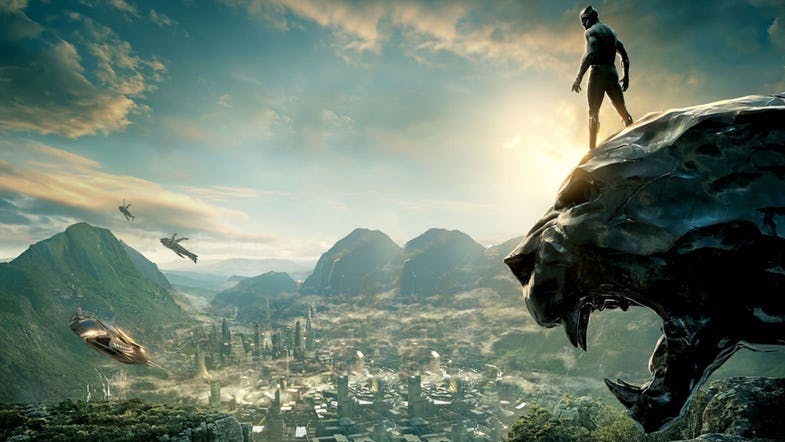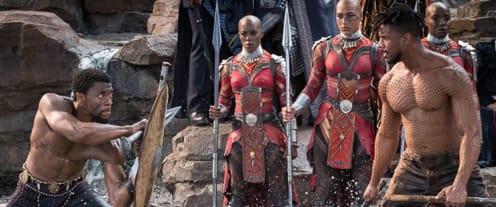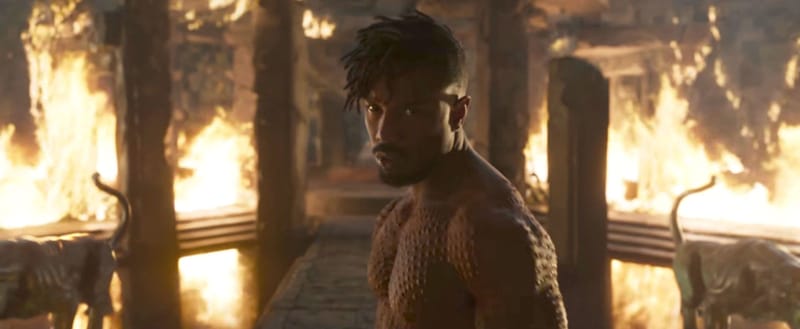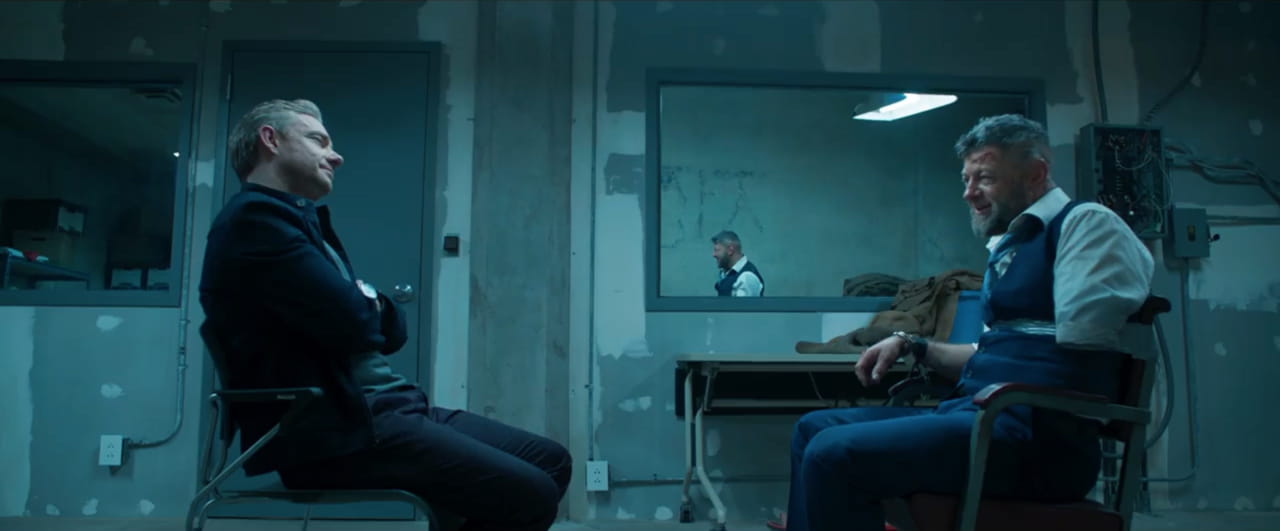Black Panther is the penultimate movie in the MCU before the all-ending Infinity War hits us in May. But this is a character who deserved more screen time than his brief stint in Civil War. Not to mention the high expectations placed on the first African superhero in the MCU, we can safely say that the director Ryan Coogler (Fruitvale Station, Creed) has brought us a movie that builds up the country in a unique position in the world, while also displaying their conflicted interests down to their personal motivations.
Spoilers lie ahead.
[caption id="" align=“aligncenter” width=“1000”]
 Black Panther in Action: Car Chase, Busan[/caption]
Black Panther in Action: Car Chase, Busan[/caption]
The nation of Wakanda has stayed hidden from the rest of the world, and has not seen colonization or slavery, keeping a lot of their customs and traditions untouched while bringing a faster advancement in technology. It is simply known to be a third world country, not attracting the attention of other world powers.
This harmony seems to be working with respect to this small nation, but their selfishness to share this with the rest of the world breeds an unfortunate monster of their making. This forms the spine for the movie, with every event further acknowledging the mistakes made.
Before proceeding forward with the review, I have to acknowledge the principally black cast, who have shown nothing but powerful performances throughout the film. The emphasis on the nation, the authenticity of the culture displayed is a tremendous show of beauty.
[caption id="" align=“aligncenter” width=“785”]
 Wakanda: Home to the Black Panther[/caption]
Wakanda: Home to the Black Panther[/caption]
The movie begins with an introduction to the history of the nation, with its origins rooted in conflict with the major tribes who unite under a leader with the powers of the Black Panther. Fast forward, we pick up a week after the events of Civil War, with T’Chaka’s death and Prince T’Challa taking up the mantle of King.
This introduces us to some of the strongest female supporting characters Marvel has introduced in recent years, including Lupita Nyong’o’s Nakia, Letitia Wright’s Shuri and Danai Gurira’s Okoye.
[caption id="" align=“aligncenter” width=“6000”]
 Okoye (Danai Gurira) and Nakia (Lyupita Nyong’o)[/caption]
Okoye (Danai Gurira) and Nakia (Lyupita Nyong’o)[/caption]
Nakia is one of the Wardogs, or spies sent to various countries. When we meet her, she is trying to dismantle a human trafficking ring. She is desperately trying to improve the situation of others outside Wakanda, and feels that the resources of the country can be put to use for the betterment of others. Okoye, the general and leader of the all-women royal guard outfit, the Dora Milaje, is sworn to protect the royal family and the king. But she possesses a moral sense, driven by her duty to protect T’Challa and to do what is right.
[caption id="" align=“aligncenter” width=“1024”]
 Shuri: Resident Genius[/caption]
Shuri: Resident Genius[/caption]
Shuri is probably one of the most intelligent people on the planet, next to Tony Stark and Bruce Banner. Her presence on screen is quite a delight, providing quite a bit of comic relief as well as fighting chops on her own.
Erik Stevens or N’Jadaka, the primary antagonist in the movie, is one of the most sensible villains in the MCU. His denied opportunity in Wakanda, along with the death of his father, fuels his story of vengeance to stake his claim on the throne, which he uses to arm the oppressed communities across the world. Michael B. Jordan plays the part to perfection, showcasing the divide between Wakanda and the rest of the world.
[caption id="" align=“aligncenter” width=“992”]
 Challenge For The King[/caption]
Challenge For The King[/caption]
In the period during T’Chaka’s rule, we see Erik’s father, Prince N’Jobu, building up a cache of arms to help their community in America rise up for a revolution. He was killed for his refusal to stop this revolution from growing further. This gives Killmonger a valid purpose to now seek revenge, honing his skills and biding his time, while waiting for the perfect time to strike. This is what makes him one of the most memorable villains in the MCU, compared to some of the more underwhelming antagonists.
[caption id="" align=“aligncenter” width=“1600”]
 Watching the world burn: Killmonger[/caption]
Watching the world burn: Killmonger[/caption]
The powers of the Black Panther are said to be obtained through a heart-shaped herb, granted by the Egyptian god Bast. By the end of the movie though, the entire field of heart-shaped herbs is burnt to ashes at the orders of N’Jadaka. This brings an end to an ancient custom, and the ability to introduce more Black Panthers, but more importantly, how vengeance can blind someone to the violence and hurt caused. It is here we understand that no matter how right Killmonger can be, the ensuing hatred is not worth it, as violence begets more violence.
[caption id="" align=“aligncenter” width=“2560”]
 Everett Ross (Martin Freeman) and Ulyssus Klaue (Andy Serkis)[/caption]
Everett Ross (Martin Freeman) and Ulyssus Klaue (Andy Serkis)[/caption]
But this is a Marvel movie, and the traditionally campy and fun moments exist, with the camaraderie between T’Challa, Shuri and Nakia being some of the movie’s highlights. Also, out of the primary cast, only two of them are white actors, consisting of Andy Serkis and Martin Freeman reprising their roles of Ulysses Klaue and Everett Ross respectively from Civil War.
Andy Serkis is at his element here, bringing another zany character to life, but Martin’s character lacks depth, due to the lack of any history and minimal screen time. Hopefully this is addressed with people hoping to see his Air Force days in Captain Marvel. Another highlight was Winston Duke’s performance as M’Baku, the leader of the Jabari tribe. His character, originally modelled after the infamous “Man-Ape”, but has seen significant changes in character to avoid stereotyping.
[caption id="" align=“aligncenter” width=“1777”]
 M’Baku and the Jabari tribe[/caption]
M’Baku and the Jabari tribe[/caption]
There were plenty of high octane moments in the film which show off not just the prowess of the eponymous hero, but also the talents of the supporting characters. This proves for quite a refreshing take on action, with the car chase in Busan a true delight and the challenges for the king some good old hand-to-hand combat. However it did feel that the final fight with Killmonger was a bit lackluster, with the CGI showing its cracks.
The tie-ins to the MCU aren’t exactly explored, making Black Panther a self-contained story. The post-credits scene does set up the Winter Soldier, Bucky Barnes’ future role as the White Wolf, instead of the new Captain America. This change may however be focused on only after the events of Avengers 4.
The movie ends with T’Challa deciding to open his country’s doors to the world, with an outreach centre set up for this very purpose. What makes this scene even more poignant is the bewildered kid, who asks T’Challa whether the aircraft is his. It indicates a powerful shift, something never seen before or even imagined possible. This moment explains the true purpose of the movie.



